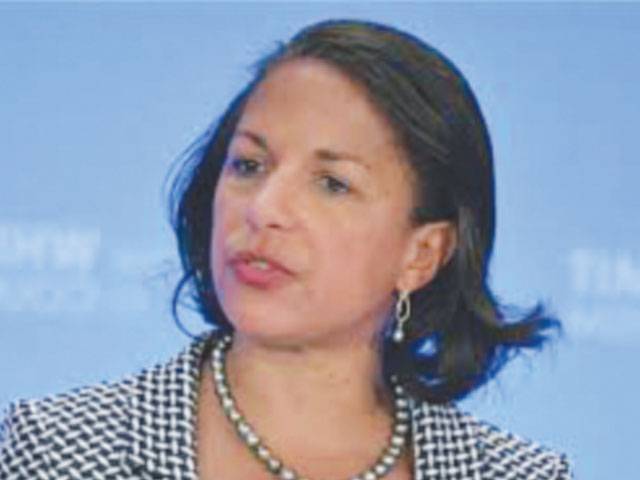WASHINGTON - President Obama’s National Security Advisor Susan Rice is coming to Pakistan on a one-day visit to discuss regional situation with country’s leadership, as tensions flare between Islamabad and New Delhi following the cancelation of bilateral talks last week.
Prime Minister Nawaz Sharif and his adviser on national security and foreign affairs, Sartaj Aziz, will hold separate meetings with the US diplomat, who is also likely to meet Army Chief General Raheel Sharif. According to reports, Rice will discuss the India-Pakistan tension due to ceasefire violations on Kashmir and Sialkot borders, besides bilateral issues and situation in Afghanistan.
But a US newspaper quoted an official as saying that top on the agenda of the national security adviser (NSA) is to press Islamabad for stepping up efforts to prevent terrorists from using its territory for attacks on its neighbors.
Ms Rice is due to meet with Pakistan’s top civilian and military leadership for discussion that will include “terrorist and militant attacks emanating from Pakistani soil,” the US official said.
Ahead of NSA’s visit, the US said on Saturday that it is confident Pakistan is aware of its responsibilities pertaining to the safety and security of its nuclear weapons.
“We continue to be confident that the government of Pakistan is aware of those responsibilities and takes those responsibilities quite seriously,” White House spokesperson Josh Earnest said at a news conference.
The remark came a day after two leading US think tanks claimed in a report that Pakistan would have more than 350 nuclear weapons in a decade, which means that the country would have the third largest stockpile of nuclear weapons after the US and Russia.
Commenting on the report, Earnest said, “I did see the report. I don’t have an official administration assessment to share with you. I would say there a couple things that come to mind.”
The spokesperson went on to add that responsibility for nuclear stockpile remains with all countries who have secured a nuclear stockpile. “This applies not just to Pakistan but to countries around the world that have a nuclear stockpile – they have a responsibility for securing that nuclear stockpile.”
Other experts had called the report overblown while Pakistan strongly rejected the report calling it a speculative hotchpotch.
Thursday, April 18, 2024
Rice to press Pakistan on anti-terror vigilance
| US says Pakistan taking its nuclear responsibilities seriously

1:55 PM | April 18, 2024
Stefanos Tsitsipas advances in Barcelona
4:19 PM | April 18, 2024
Met Office predicts more rains across country till April 29
2:51 PM | April 18, 2024
Punjab changes school timings for summer season
1:55 PM | April 18, 2024
Enemies of Pakistan are unable to digest investment in the country: Ataullah Tarar
1:29 PM | April 18, 2024
IHC restores Bushra Bibi's appeal for shifting to Adiala Jail from Bani Gala
1:24 PM | April 18, 2024
Hepatitis Challenge
April 18, 2024
IMF Predictions
April 18, 2024
Wheat War
April 18, 2024
Rail Revival
April 17, 2024
Addressing Climate Change
April 17, 2024
Justice denied
April 18, 2024
AI dilemmas unveiled
April 18, 2024
Tax tangle
April 18, 2024
Workforce inequality
April 17, 2024
New partnerships
April 17, 2024
ePaper - Nawaiwaqt
Advertisement
Nawaiwaqt Group | Copyright © 2024





